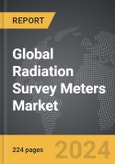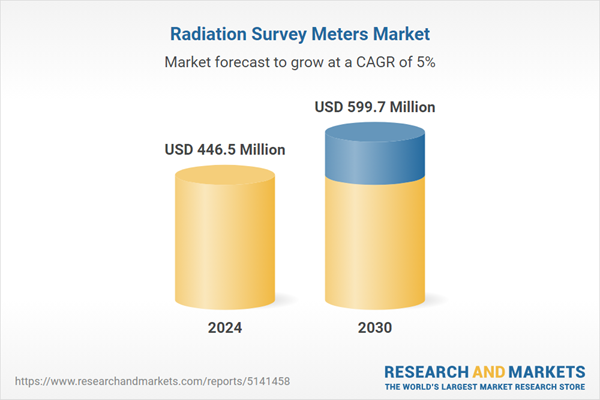Global Radiation Survey Meters Market - Key Trends and Drivers Summarized
What Are Radiation Survey Meters and How Do They Function in Radiation Detection?
Radiation survey meters are portable devices used to detect and measure levels of ionizing radiation in various environments, including medical, industrial, and environmental settings. These meters are essential for ensuring safety in areas where radiation is present, such as hospitals, nuclear power plants, laboratories, and research facilities. Radiation survey meters work by detecting gamma rays, X-rays, beta particles, and other forms of ionizing radiation, providing real-time readings of radiation levels. The readings help determine whether the radiation levels are within safe limits and if protective measures need to be taken. These devices are crucial for protecting workers, the public, and the environment from the harmful effects of radiation exposure, making them indispensable tools in radiation safety management.How Are Technological Advancements Improving Radiation Survey Meters?
Technological advancements have significantly enhanced the accuracy, sensitivity, and ease of use of radiation survey meters, making them more effective in various applications. Modern survey meters now incorporate advanced detection technologies, such as scintillation detectors and solid-state sensors, which offer higher sensitivity and faster response times than traditional Geiger-Müller tubes. These advancements allow for the detection of lower levels of radiation, enabling more precise monitoring in environments where even small amounts of radiation can pose a risk. The integration of digital displays and data logging capabilities has also improved the functionality of survey meters, allowing users to record and analyze radiation data over time. Additionally, the development of wireless connectivity and remote monitoring features has made it possible to use survey meters in hazardous or hard-to-reach areas, enhancing safety and convenience. These technological improvements are driving the adoption of advanced radiation survey meters in a wide range of industries and applications.What Are the Key Applications and Benefits of Radiation Survey Meters in Various Sectors?
Radiation survey meters are used in a wide range of applications, offering numerous benefits that enhance safety, compliance, and operational efficiency. In the medical field, these meters are essential for monitoring radiation levels in radiology departments, ensuring that equipment is functioning correctly and that radiation exposure to patients and staff is minimized. In the nuclear industry, radiation survey meters are used to monitor radiation levels in power plants, research facilities, and waste management sites, helping to protect workers and the environment from potential radiation hazards. Environmental monitoring is another critical application, where survey meters are used to detect radiation in air, water, and soil, particularly in areas affected by nuclear accidents or contamination. The devices are also used in industrial settings, such as oil and gas, where radioactive materials may be used in exploration and production processes. The primary benefits of radiation survey meters include their ability to provide accurate, real-time measurements of radiation levels, their portability and ease of use, and their role in ensuring compliance with safety regulations and standards, making them essential tools for radiation protection.What Factors Are Driving the Growth in the Radiation Survey Meters Market?
The growth in the Radiation Survey Meters market is driven by several factors. The increasing focus on radiation safety in healthcare, nuclear power, and industrial sectors is a significant driver, as these industries require reliable tools for monitoring radiation levels and protecting workers and the public. Technological advancements in radiation detection and measurement are also propelling market growth by improving the sensitivity, accuracy, and usability of survey meters. The growing demand for environmental monitoring and radiation detection in response to concerns about nuclear accidents, terrorism, and environmental contamination is further boosting the adoption of radiation survey meters. Additionally, stringent regulatory requirements related to radiation safety are contributing to market growth, as organizations seek to comply with safety standards and avoid penalties. The expansion of nuclear power generation and the increasing use of radioactive materials in various industrial applications are also supporting market growth. These factors, combined with continuous innovation in radiation detection technology, are driving the sustained growth of the Radiation Survey Meters market.Report Scope
The report analyzes the Radiation Survey Meters market, presented in terms of market value (USD). The analysis covers the key segments and geographic regions outlined below.- Segments: Product (Scintillation Detectors, Neutron Detectors, Geiger Counters); Application (Healthcare, Industry & Manufacturing, Defense, Other Applications).
- Geographic Regions/Countries: World; United States; Canada; Japan; China; Europe (France; Germany; Italy; United Kingdom; Spain; Russia; and Rest of Europe); Asia-Pacific (Australia; India; South Korea; and Rest of Asia-Pacific); Latin America (Argentina; Brazil; Mexico; and Rest of Latin America); Middle East (Iran; Israel; Saudi Arabia; United Arab Emirates; and Rest of Middle East); and Africa.
Key Insights:
- Market Growth: Understand the significant growth trajectory of the Scintillation Detectors segment, which is expected to reach US$305.2 Million by 2030 with a CAGR of 5.6%. The Neutron Detectors segment is also set to grow at 4.3% CAGR over the analysis period.
- Regional Analysis: Gain insights into the U.S. market, valued at $118.5 Million in 2024, and China, forecasted to grow at an impressive 8.1% CAGR to reach $131.5 Million by 2030. Discover growth trends in other key regions, including Japan, Canada, Germany, and the Asia-Pacific.
Why You Should Buy This Report:
- Detailed Market Analysis: Access a thorough analysis of the Global Radiation Survey Meters Market, covering all major geographic regions and market segments.
- Competitive Insights: Get an overview of the competitive landscape, including the market presence of major players across different geographies.
- Future Trends and Drivers: Understand the key trends and drivers shaping the future of the Global Radiation Survey Meters Market.
- Actionable Insights: Benefit from actionable insights that can help you identify new revenue opportunities and make strategic business decisions.
Key Questions Answered:
- How is the Global Radiation Survey Meters Market expected to evolve by 2030?
- What are the main drivers and restraints affecting the market?
- Which market segments will grow the most over the forecast period?
- How will market shares for different regions and segments change by 2030?
- Who are the leading players in the market, and what are their prospects?
Report Features:
- Comprehensive Market Data: Independent analysis of annual sales and market forecasts in US$ Million from 2024 to 2030.
- In-Depth Regional Analysis: Detailed insights into key markets, including the U.S., China, Japan, Canada, Europe, Asia-Pacific, Latin America, Middle East, and Africa.
- Company Profiles: Coverage of players such as Fuji Electric Co., Ltd., Hitachi Ltd., Ludlum Measurements, Inc., Mirion Technologies, Inc., Polimaster Ltd. and more.
- Complimentary Updates: Receive free report updates for one year to keep you informed of the latest market developments.
Some of the 44 companies featured in this Radiation Survey Meters market report include:
- Fuji Electric Co., Ltd.
- Hitachi Ltd.
- Ludlum Measurements, Inc.
- Mirion Technologies, Inc.
- Polimaster Ltd.
- Thermo Fisher Scientific, Inc.
This edition integrates the latest global trade and economic shifts into comprehensive market analysis. Key updates include:
- Tariff and Trade Impact: Insights into global tariff negotiations across 180+ countries, with analysis of supply chain turbulence, sourcing disruptions, and geographic realignment. Special focus on 2025 as a pivotal year for trade tensions, including updated perspectives on the Trump-era tariffs.
- Adjusted Forecasts and Analytics: Revised global and regional market forecasts through 2030, incorporating tariff effects, economic uncertainty, and structural changes in globalization. Includes historical analysis from 2015 to 2023.
- Strategic Market Dynamics: Evaluation of revised market prospects, regional outlooks, and key economic indicators such as population and urbanization trends.
- Innovation & Technology Trends: Latest developments in product and process innovation, emerging technologies, and key industry drivers shaping the competitive landscape.
- Competitive Intelligence: Updated global market share estimates for 2025, competitive positioning of major players (Strong/Active/Niche/Trivial), and refined focus on leading global brands and core players.
- Expert Insight & Commentary: Strategic analysis from economists, trade experts, and domain specialists to contextualize market shifts and identify emerging opportunities.
Table of Contents
Companies Mentioned (Partial List)
A selection of companies mentioned in this report includes, but is not limited to:
- Fuji Electric Co., Ltd.
- Hitachi Ltd.
- Ludlum Measurements, Inc.
- Mirion Technologies, Inc.
- Polimaster Ltd.
- Thermo Fisher Scientific, Inc.
Table Information
| Report Attribute | Details |
|---|---|
| No. of Pages | 224 |
| Published | February 2026 |
| Forecast Period | 2024 - 2030 |
| Estimated Market Value ( USD | $ 446.5 Million |
| Forecasted Market Value ( USD | $ 599.7 Million |
| Compound Annual Growth Rate | 5.0% |
| Regions Covered | Global |









